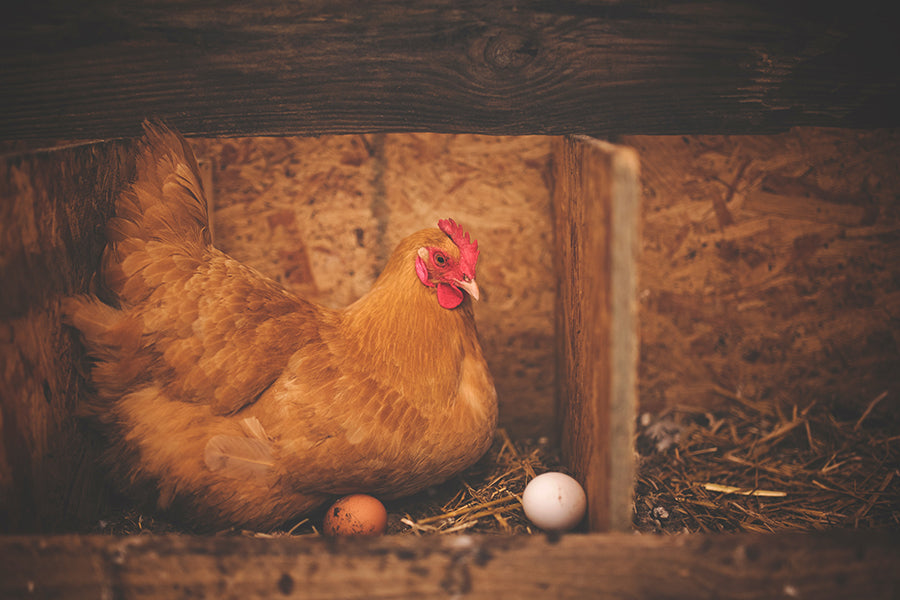Normally associated with big barnyards and country living, chickens are becoming the new urban backyard animal. Not only are they a low-maintenance and personable pet, they will also provide you with fresh eggs, happily clear your yard of pests and produce an excellent natural fertilizer. While owning chickens has its perks, it also comes with some rules and responsibilities that every animal owner should know.

0-8 weeks old
Habitat
Chickens are flock animals that like to be kept in groups of two or more. If you get your chickens as baby chicks, make sure you have an appropriate set-up ready for them at home.
Baby chicks less than 8 weeks old don’t have their insulating feathers in yet and can’t regulate their own body temperature. They’ll need a small set-up indoors, like a long wire enclosure or pen, with a heat lamp over one side of the enclosure to provide a range of temperate areas.
Putting down a layer of shavings or straw will make cleaning out the enclosure an easy process. Like all birds, chickens are messy, and their bedding will need to be changed frequently.
Diet
Baby chicks are very fast growing and will need a specially formulated diet called ‘starter’ mash, which you can place in a small ground level feeder.
To ensure balanced nutrition, treats or adult chicken feed should be withheld until they are 8 weeks old. The only exceptions are fresh mealworms that are packed with protein and fats and a great training treat. Adding a probiotic and vitamin supplement to the chicks’ water will also help your chicks thrive.
8 weeks and older
Habitat
After 8 weeks, a chicken can begin living outside. You don’t need a fancy barn or big backyard to house a few chickens, just a well-built coop, though they do prefer to forage for bugs and seeds during the day. Your chicken coop should offer 3-4 square feet of ground space per chicken and include an enclosed nest box where they can lay eggs and stay dry during rain and cooler seasons.
Use tightly meshed chicken coop wire to prevent small animals, like raccoons and opossums, from reaching through and be sure to construct an enclosure that’s strong enough to deter larger predators, like coyotes. Even in residential areas, predators will sniff out a coop and try to make off with your chickens, so you’ll need a sturdy coop with a solid foundation and tight wire.
Behavior
When observing your chickens, don’t be surprised if you see them kicking up a little dust here and there. Chickens will naturally dig shallow holes in the dirt and give themselves a daily dust bath to keep their feathers and skin clean. Providing your chickens with a shallow dust bowl of clean dirt mixed with diatomaceous earth will repel any mites or fleas that might irritate or carry disease to your flock.
Diet
Depending on their specific needs, hens are typically fed layer crumble or pellet to promote egg production. Adding helpful ingredients to their diet, like oyster shells, mealworms, vegetables, and probiotics, can help them maintain healthy plumage and strong immune systems. Chickens also love their fair share of treats, so be sure to reward them with worms, scratch and, on warmer days, frozen vegetables.
Eggs
Now, let’s get to one of the biggest benefits that comes with owning a chicken – eggs! The ability to pick fresh eggs is definitely a huge plus for owners, but there are a few facts and misconceptions you should be aware of.
First, it is a common myth that you need a rooster for your hens to lay eggs. In reality, a rooster is only desirable if you intend to breed your chickens.
Different breeds of chicken will lay eggs at different frequency, so do not be alarmed if your hen doesn’t lay every day. Periods of extremely hot or cold weather can also cause hens to temporarily stop laying, but most hens will intermittently continue to lay delicious eggs for several years.
If your hens choose to lay somewhere other than the nest box, try moving the eggs to the box and leave them for a few days until your hens recognize it as the new official nesting spot.
You may notice eggs with a broken or soft shell, which is usually an indication that they are low on calcium. To enrich your chicken’s diet and boost their calcium levels, consider adding more oyster shells or calcium supplements to their diet.
Kahooligan Tip - Friendly and low-maintenance, chickens are an excellent pet for new animal owners. They have very few requirements and provide a wealth of benefits, making them a great investment. That said, if you are interested in taking on the responsibility of owning a chicken, you need to understand their diet, behavior and other unique traits. Before you purchase a chicken, consider consulting with your local Kahooligan to find out the best feed, supplements and products for their unique needs.


